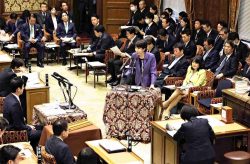
Yomiuri Shimbun building in Chiyoda Ward, Tokyo
17:15 JST, April 26, 2024
To curb the acceleration of declining birthrates and stem population decrease, it is crucial to overcome the so-called second child barrier — the reluctance to have more than one child. Many struggle to balance their work and finances with child-rearing, necessitating a reassessment of work practices to create an environment conducive to raising children safely.
“My child is lovely, but raising one requires more help and resources than we have. Having a second child just isn’t realistic,” says a 33-year-old female office worker, who is raising her seven-month-old daughter in Kyushu.
Her husband, a 37-year-old office worker, assists with child-rearing but has demanding work hours starting early in the morning. Their parents live far away and after her mother, who had come to help, returned home one month postpartum, the woman had no one else to turn to.
Raising a child alone, a practice known as solo parenting, led the woman to experience sleeplessness, stress and fatigue, which stopped breast milk production. Three months after giving birth, she moved closer to her parents’ home with her daughter, telling her husband that the separation would be “only during maternity leave.” Now, she is getting help from her mother and other relatives.
However, she dreads the thought of returning to solo parenting after her maternity leave ends next spring. She wants to spend time with her child, but if she works a reduced schedule at her current job, her salary drops to that of a part-time employee.
“Considering various factors, including living expenses, education, and our savings for life after retirement, I’ll have to manage both a full-time job and parenting,” she said.
She has a sibling and had wanted two children of her own, but now she and her husband have decided to focus on raising just one child.
According to the Japanese National Fertility Survey conducted by the National Institute of Population and Social Security Research in 2021, the completed fertility rate, which represents the average number of children a couple has by the end of their fertile life, has been hovering around 1.9 since it first dropped below two in 2010. Until the early 2000s, nearly 90% of couples had two or more children, but by 2021 this had decreased to about 70%. Young couples, where the wife is under 35 years old, cited several reasons for not having the number of children they want, such as: “child-rearing and education costs too much” (78%), “[I] can no longer endure the burden of childcare” (23%) and “it interferes with my job” (21%).
“As the proportion of dual-income households increase, the barrier to having a second child is getting higher. Balancing child-rearing and work is difficult, and only those blessed with vitality, physical strength, and financial resources can feel motivated to raise another child,” said Prof. Junya Tsutsui a specialist in family sociology at Ritsumeikan University.
He highlights key measures to break down this barrier, including reducing long work hours, promoting flexible working arrangements such as remote work that are compatible with childcare, and ensuring that working reduced hours does not negatively affect career progression or income.
Tsutsui also said: “A society where income and employment are stable, and the future can be planned with more certainty, is also a society where those who are single can feel more positive about marrying and having children. We should, as a nation, dedicate efforts to work style reforms as a measure against declining birthrates.”
Top Articles in Society
-

Producer Behind Pop Group XG Arrested for Cocaine Possession
-

Man Infected with Measles Reportedly Dined at Restaurant in Tokyo Station
-

Man Infected with Measles May Have Come in Contact with Many People in Tokyo, Went to Store, Restaurant Around When Symptoms Emerged
-

Woman with Measles Visited Hospital in Tokyo Multiple Times Before Being Diagnosed with Disease
-

Australian Woman Dies After Mishap on Ski Lift in Nagano Prefecture
JN ACCESS RANKING
-

Producer Behind Pop Group XG Arrested for Cocaine Possession
-

Japan PM Takaichi’s Cabinet Resigns en Masse
-

Man Infected with Measles Reportedly Dined at Restaurant in Tokyo Station
-

Israeli Ambassador to Japan Speaks about Japan’s Role in the Reconstruction of Gaza
-

Videos Plagiarized, Reposted with False Subtitles Claiming ‘Ryukyu Belongs to China’; Anti-China False Information Also Posted in Japan






















